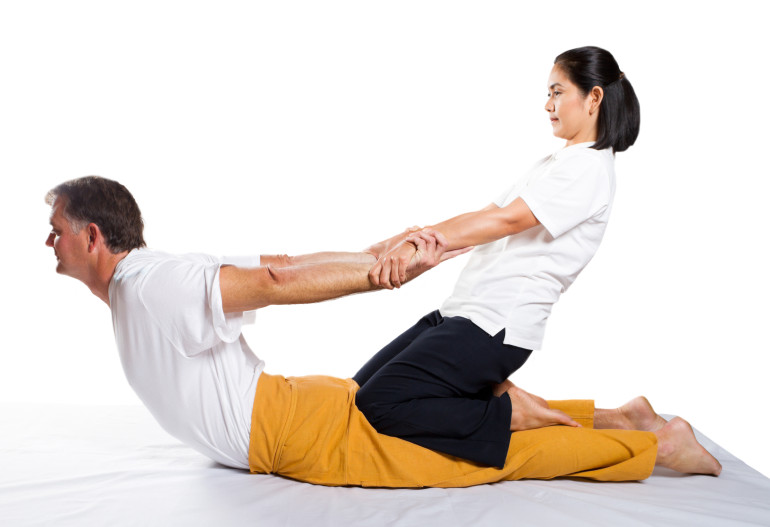Search Massage Therapists in your Area
Thai massage is a style of massage developed by a physician to Buddha named Jivaka Kumar Bhaccha. The style found its way to Thailand, causing its Ayurvedic techniques to become integrated with the traditions of Chinese medicine. Initially, Thai massage was practiced by monks as part of Thai medicine.
Typically, Thai massage is more rigorous than other forms, which also makes it more energizing. It is also referred to as Thai yoga massage because the massage therapist may use his or her arms, knees, and feet in addition to hands in order to manipulate the muscles through yoga-like movements. Some massage therapists may also use acupressure during sessions.
What are the benefits of Thai Massage?
Like other forms of massage, Thai massage has many benefits, both physical and mental/emotional. Some of these benefits can be experienced after only one session of Thai massage, while others become apparent after multiple, regular sessions.
One of the biggest benefits is the relaxation that comes from it. Numerous studies have shown that those who have massages are more relaxed, and many seek out massage as a form of relaxation. This, paired with the yoga-like elements of Thai massage, which is also relaxing, ensures that Thai massage can help even the most tense person find relaxation. Along with this, Thai massage is an excellent way to relieve stress. Since stress can have long-term and serious effects on the body and mind, using Thai massage to help relieve stress will help improve overall health.
Because of the deep-tissue manipulation involved in Thai massage, another benefit is increased circulation throughout the body. The physical touch of the massage promotes blood flow, and when you have increased circulation and improved blood flow, blood and oxygen get to your body more effectively, improving your overall health.
Thai massage is a full-body massage. Since the massage therapist moves your body in yoga-like positions and movements, regular Thai massage can also increase your flexibility and range of motion. This can be particularly helpful during a physician-approved rehabilitation program following an injury or illness.
Because Thai massage is more rigorous than other forms of massage, it is more invigorating. The benefit of this is that you will walk away from your massage session feeling more energized. This is also a side-effect of relieving stress and increased circulation, but increased energy can also help you in other areas of your life, such as getting through slow afternoons at work.
What should be considered before booking a Thai massage session?
Before making the decision to have a Thai massage session, there are some things that you should keep in mind. There are some people who should avoid this type of massage in order to protect their health. These people include:
Those prone to blood clots, due to a risk of clots being dislodged during the session.
Those recovering from surgery.
Those who have just had chemotherapy or radiation treatments.
Women who are pregnant or those with heart disease should consult their physicians before having a Thai massage. Additionally, massage should not be done directly over bruises, tumors, abdominal hernia, inflamed skin, unhealed wounds, or areas of recent fractures.
Additionally, you should make sure your massage therapist knows your relevant medical and health history in order to tailor your massage session to your needs and any restrictions you may have.
Thai massage is a very different form than other popular forms of massage such as Swedish massage. It is more rigorous and intense, but because of this, Thai massage has many incredible benefits to those who book regular sessions with a Thai massage therapist. If you are looking to relax, relieve stress, and improve your flexibility and energy levels, Thai massage may just be the answer.